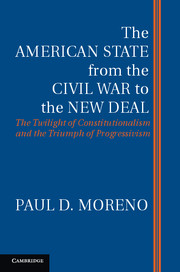 The American State from the Civil War to the New Deal
The American State from the Civil War to the New Deal Book contents
- Frontmatter
- Contents
- Abbreviations Used in the Footnotes
- Acknowledgments
- Introduction
- Part I The Old Regime
- Part II Early Progressivism
- 4 The New Jurisprudence
- 5 The Due Process Dialectic
- 6 Toward a Federal Police Power
- 7 Rooseveltian Progressivism
- 8 The Lochner Incident
- 9 Court and Constitution in Crisis
- 10 Taft and the Republican Crackup
- Part III Late Progressivism
- Part IV The New Deal
- Appendix A
- Appendix B
- Primary Sources
- Index
- References
7 - Rooseveltian Progressivism
Published online by Cambridge University Press: 05 May 2013
- Frontmatter
- Contents
- Abbreviations Used in the Footnotes
- Acknowledgments
- Introduction
- Part I The Old Regime
- Part II Early Progressivism
- 4 The New Jurisprudence
- 5 The Due Process Dialectic
- 6 Toward a Federal Police Power
- 7 Rooseveltian Progressivism
- 8 The Lochner Incident
- 9 Court and Constitution in Crisis
- 10 Taft and the Republican Crackup
- Part III Late Progressivism
- Part IV The New Deal
- Appendix A
- Appendix B
- Primary Sources
- Index
- References
Summary
THE HOLMES APPOINTMENT
Theodore Roosevelt’s presidency in 1901 significantly advanced progressivism. Roosevelt’s personal enthusiasm for active government, and particularly for war, could only clash with a constitution premised on the idea of limited government and especially vulnerable to war. Even his admiring biographers note that “in Roosevelt’s many-sided character perhaps the dominant urge was his desire for power,” and discern “a certain fondness for war.” He wanted his first Supreme Court appointment to preserve the fruits of the Spanish-American War, whose conquests and cessions raised fundamental questions of republican constitutionalism. The Court split evenly on the question of whether all of the guarantees of the Constitution extended to conquered territory – in the popular phrasing, whether “the Constitution follows the flag.” The “laissez-faire” justices sharply criticized imperialist policy. Fuller, Harlan, Brewer, and Peckham held that the Constitution applied anywhere the United States claimed sovereignty. Justice Brewer publicly chastised Roosevelt’s foreign policy. The Founders did not free us from British tyranny and then claim “the power to hold other territory in like colonial subjection.” Notwithstanding his reverence for the Founders, Brewer believed that Roosevelt’s presidency indicated that the Constitution should limit the executive to one term.
- Type
- Chapter
- Information
- The American State from the Civil War to the New DealThe Twilight of Constitutionalism and the Triumph of Progressivism, pp. 86 - 95Publisher: Cambridge University PressPrint publication year: 2013


